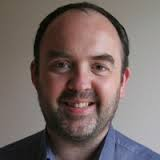Predictive Models of Development Teams and the Systems They Build
Wednesday 7th October 2015, 6:30 pm.
Speaker: Robert Smallshire.
Venue: Room 4.31, University of Edinburgh Informatics Forum, 10 Crichton Street, Edinburgh, EH8 9AB.
This event is free of charge and open to all. No registration required - just turn up.
Refreshments and networking from 6:00 pm.
 This meeting is supported by NCR. This meeting is supported by NCR.
Synopsis
It's awkward to perform science experiments on developers, so let's simulate them instead!
In 1968 Melvin Conway pointed out a seemingly inevitable symmetry between organisations and the software systems they construct. Organisations today are more fluid than 40 years ago, with short developer tenure, and frequent migration of individuals between projects and employers. In this slot we’ll examine – and perhaps collect – data on the tenure and productivity of programmers and use this to gain insight into codebases, by simulating their growth with simple stochastic models. From such models, we can make important predictions about the maintainability and long-term viability of software systems, with implications for how we approach software design, documentation and how we assemble teams.
About the speaker
 |
|
Robert is a founding director of Sixty North, a software product and consulting business in Norway. He has worked in senior architecture and technical management roles for several software companies, providing tools in the energy sector for dealing with the masses of information flowing from today’s digital oil fields. He has dealt with understanding, designing, advocating and implementing effective architectures for sophisticated scientific and enterprise software in Python, C++, C# and F# and JavaScript.
Robert is a regular speaker at conferences, meet-ups and corporate software events, and can be found speaking about topics as diverse as behavioural microeconomics in software development to implementing web services on 8-bit microcontrollers. He is the organiser of the Oslo Python group and holds a PhD in a natural science.
|
|